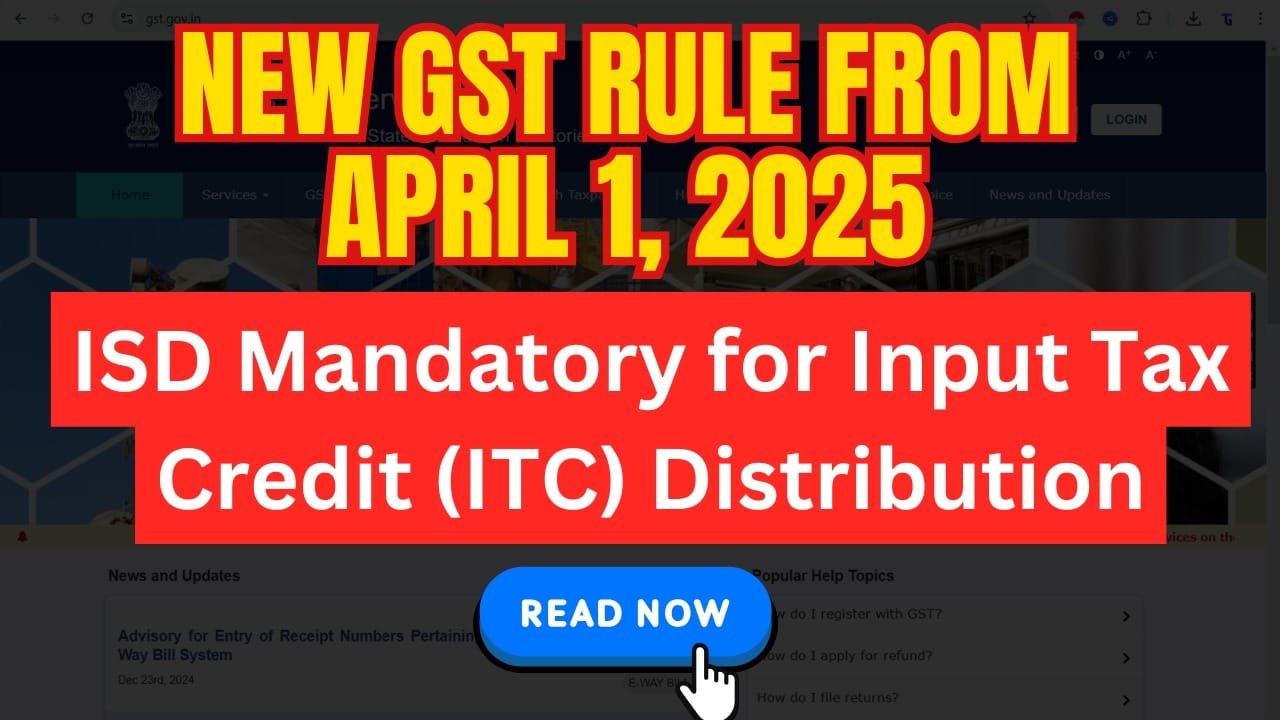ISD Mandatory for Input Tax Credit
ISD Mandatory for Input Tax Credit Starting April 1, 2025, businesses with multiple GST registrations under the same PAN must adopt the Input Service Distributor (ISD) mechanism to distribute common input tax credits (ITC). Non-compliance with this rule may lead to ITC denial and a minimum penalty of Rs 10,000.
Background on ISD and Cross-Charge
Since GST’s introduction in July 2017, businesses have faced confusion regarding ITC distribution methods. ISD Mandatory for Input Tax Credit While some entities followed the ISD mechanism, others opted for the cross-charge method. ISD Mandatory for Input Tax Credit The CBIC’s July 2023 clarification stated that ISD was optional. However, from April 1, 2025, the ISD mechanism becomes mandatory.
What is the ISD Mechanism?
The ISD mechanism allows businesses to distribute common ITC related to services used across multiple GST registrations. An ISD entity collects invoices for such services and then distributes the eligible ITC to respective GST registrations.
Key Examples of Common Services Requiring ISD Distribution
- Audit services (statutory or tax)
- Software licenses
- Manpower supply services
- Banking services
- Consultancy and compliance services
- Litigation services
- Security services
New GST Rule Effective April 1, 2025
From April 1, 2025, businesses must use the ISD mechanism to distribute ITC for common services consumed by multiple locations.
ITC Distribution Rules under ISD
| Type of Service | ISD Location & Service Consumption Location | Nature of ITC for ISD | Distribution of ITC by ISD |
| Forward Charge Services | Same State | CGST + SGST | CGST + SGST |
| Forward Charge Services | Different State | CGST + SGST | IGST |
| Forward Charge Services | Different State | IGST | IGST |
| Reverse Charge Services | Same State | CGST + SGST | CGST + SGST |
| Reverse Charge Services | Different State | CGST + SGST | IGST |
Conditions for ISD ITC Distribution
- Timely Distribution: ISD Mandatory for Input Tax Credit ITC for a particular month must be distributed within the same month.
- Distribution to Unregistered or Exempt Supply Locations: Even offices with exempt supplies or no GST registration must receive their share of ITC if they consumed common services.
- Pro-rata Basis Distribution: For services used at multiple locations, ITC will be allocated based on the turnover ratio of the recipient locations.
Key Challenges for GST Taxpayers
The new ISD rule introduces several challenges for businesses:
- Separate ISD Registration Required
Businesses must obtain a separate GST registration specifically for ISD purposes, even if they already have a regular GST registration.
- Bifurcation of Common Expenses
Taxpayers must classify expenses into:
- Services consumed by multiple locations (via ISD)
- Services consumed internally for supply to other locations (via cross-charge)
- Invoice Restructuring
Businesses need to analyze whether invoices for multi-location services can be billed directly to respective locations to simplify ITC allocation.
- Vendor Communication
Taxpayers must inform vendors about their new ISD GSTIN to ensure invoices are correctly issued for services consumed across locations.
- IT System Changes
IT systems must be updated to:
- Add ISD registration details
- Create ISD-specific ledgers for inward invoices, ISD credit notes, and outward ISD invoices
- Map common input services consumed at multiple locations
- Team Training
Businesses must train their procurement, accounts, and tax filing teams to ensure accurate ITC recording and reconciliation.
- Additional GST Compliance
- Filing of GSTR-6 for ISD transactions
- Reconciliation of data from GSTR-6A before filing GSTR-6
- Accurate reporting of ITC received via ISD in Table 4 of GSTR-3B
Consequences of Non-Compliance
Failing to comply with the ISD rule can have serious consequences:
- ITC Denial: ISD Mandatory for Input Tax Credit Common ITC claimed without following the ISD mechanism may be disallowed.
- ITC Recovery with Interest: Any excess ITC distribution may be recovered by tax authorities with interest.
- Penalty: Non-compliance may result in a penalty of Rs 10,000 or an amount equivalent to the irregular ITC distributed, whichever is higher.
Steps for Businesses to Ensure Compliance
To prepare for the ISD mechanism becoming mandatory, businesses should: ✅ Identify services requiring ISD distribution.
✅ Apply for a separate ISD registration in advance.
✅ Train teams to handle ISD-specific invoices and compliance.
✅ Inform vendors about the new ISD GSTIN.
✅ Update accounting and IT systems to handle ISD transactions.
Conclusion
The mandatory ISD rule effective from April 1, 2025, aims to streamline ITC distribution for businesses with multi-state GST registrations. ISD Mandatory for Input Tax Credit Companies must proactively implement ISD registration, restructure invoicing practices, and prepare their teams to avoid ITC denial and penalties. Early preparation will help businesses stay compliant and manage their ITC efficiently.
For More Information : https://taxgyany.com/

